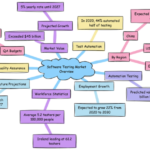
How to Become a QA Engineer: Unlock the secrets to bug detection, automation tools, and test plans to excel in quality assurance.
This quick answer box summarizes the key steps and considerations for becoming a QA engineer
How to Become a QA Engineer:
- Gain a strong understanding of software development and testing principles
- Develop technical skills like programming languages and QA tools
- Obtain relevant education and certifications (CS degree, ISTQB, etc.)
- Get hands-on experience via internships, entry-level roles, side projects
- Consider specializing in an area like automation, security, or performance testing
- Pursue continuing education and professional development opportunities
- Work your way up to advanced roles like QA lead or manager
Understanding the Role of a QA Engineer
Quality assurance (QA) engineers play a critical role in the software development process. As a QA engineer, your primary responsibility is to ensure the quality and functionality of software applications. This involves performing various tests and checks on software products to identify any defects or bugs that could negatively impact the end-user experience.
The testing role of the QA engineer is vital in ensuring that software products are reliable and perform as expected. To achieve this, QA engineers collaborate closely with developers and other stakeholders to clarify requirements, plan and execute tests, and troubleshoot issues that arise during the development process.
Understanding the Role of a QA Engineer: Duties and Responsibilities
Some of the key duties and responsibilities of a QA engineer include:
- Creating test plans and test cases to ensure comprehensive test coverage
- Executing functional, performance, and regression tests to identify defects or bugs
- Identifying and documenting defects or bugs, and working with developers to resolve them
- Collaborating with developers and other stakeholders to ensure software requirements are met
- Performing automated and manual testing to ensure software products meet quality standards
By understanding these responsibilities of the QA engineer, you can begin to appreciate the significance of their role in ensuring the quality of software products and the success of software development projects.
Essential Skills for a QA Engineer

QA engineers play a crucial role in the software development process by ensuring that applications function properly and meet user requirements. To become a successful QA engineer, it is essential to possess a combination of technical and soft skills.
Technical Skills
First and foremost, a QA engineer must have a solid understanding of the software development lifecycle and the principles of software testing. This includes knowledge of testing methods, test case development, and defect tracking.
In addition, QA engineers must be proficient in programming languages such as Java, C++, Python, or Ruby. They should also have experience with test automation tools such as Selenium or Appium.
Furthermore, QA engineers must have a good understanding of databases and SQL for data validation and manipulation. Knowledge of operating systems and network protocols can help with identifying issues related to system integration as well.
Soft Skills
Aside from technical skills, QA engineers must possess certain soft skills that are integral to their role. Attention to detail and strong problem-solving abilities are essential for identifying and troubleshooting issues in software applications.
Effective communication and collaboration skills are also important, as QA engineers work closely with developers, project managers, and other stakeholders throughout the software development process.
Lastly, a QA engineer must be adaptable and able to work under pressure. Software development is a fast-paced environment and deadlines can be tight, so being able to prioritize tasks and manage time effectively is crucial.
Education and Qualifications
Education is an essential step in becoming a successful QA engineer. While a degree is not necessarily required, it can help you stand out in a competitive job market. A degree in computer science, software engineering, or a related field can provide a solid foundation in the fundamentals of software development and quality assurance.
Many employers also value certifications that demonstrate a candidate’s expertise in quality assurance. Certifications such as Certified Software Quality Analyst (CSQA) or ISTQB Certified Tester can give your career a boost by validating your knowledge and skills.
| Degree | Certification |
|---|---|
| Bachelor’s or master’s degree in computer science, software engineering, or related field | CSQA, ISTQB Certified Tester |
It’s important to note that while education and certification can enhance career prospects, they are not the only factors employers consider when hiring for QA engineer roles. Employers also value practical experience and strong problem-solving skills.
Continuing Education
Continuing education is crucial to staying up-to-date on the latest trends and technologies. QA engineers must constantly adapt to new testing tools and techniques, as well as evolving software development methodologies.
There are many continuing education opportunities available for QA engineers, including online courses, workshops, and conferences. These resources can help you stay informed about the latest trends in QA engineering and develop the skills needed to advance your career.
- Online courses: Sites like Udemy.com, Coursera, and edX offer a wide range of courses in software testing and quality assurance.
- Conferences: Attending industry conferences like the Software Testing Conference or the Quality Assurance and Testing Conference can provide valuable networking opportunities and insights into the latest tools and trends.
By investing in continuing education, you can stay ahead of the curve and position yourself for long-term success as a QA engineer.
Gaining Experience in QA Engineering

As an aspiring QA engineer, gaining practical experience is crucial to developing your skills and advancing your career. There are several different ways to gain experience in QA engineering, including internships, entry-level positions, and side projects.
Internships
Internships are an excellent way to gain hands-on experience in QA engineering. Many software development companies offer internships to college students or recent graduates who are interested in pursuing a career in QA engineering.
During an internship, you will work alongside experienced QA engineers and learn about the software development process. You will have the opportunity to assist with testing and quality assurance tasks, and you may also have the chance to work on your own projects.
Entry-Level Positions
Entry-level positions in QA engineering are another way to gain experience in the field. These positions typically require some prior knowledge of software testing and quality assurance, but they do not require extensive professional experience.
As an entry-level QA engineer, you will work alongside more experienced engineers and learn about the software development process. You will also have the opportunity to contribute to testing and quality assurance tasks.
Side Projects
Side projects are a great way to gain practical experience in QA engineering while also demonstrating your skills to potential employers. These projects can include creating your own testing frameworks or designing your own test cases for open source software projects.
Side projects can also help you develop your technical skills and stay up-to-date with the latest tools and technologies used in QA engineering.
No matter how you choose to gain experience in QA engineering, it is important to take advantage of every opportunity available to you. The more practical experience you have, the more competitive you will be in the job market.
Specializations in QA Engineering
QA engineering is a diverse field that offers a range of specializations. A specialization in QA engineering can help you focus your expertise and increase your value in the job market. Here are a few areas of specialization you can consider:
Manual Testing
Manual testing involves the use of manual processes to test software applications. It requires a keen eye for detail, strong analytical skills, and an understanding of the software development process. Manual testers work closely with developers and designers to identify bugs and issues in the software.
Automated Testing
Automated testing involves the use of software tools to test software applications. It requires knowledge of programming languages and automation frameworks such as Selenium and Appium. Automated testers work on developing automation scripts, executing automated tests, and analyzing the results to identify issues and bugs.
Performance Testing
Performance testing involves the testing of software applications to ensure they function well under heavy loads. It requires knowledge of tools such as JMeter and LoadRunner to simulate user activity and measure the application’s performance. Performance testers work closely with developers to identify issues related to load times, response times, and scalability.
Security Testing
Security testing involves the testing of software applications to identify vulnerabilities and potential security breaches. It requires knowledge of security testing tools such as Burp Suite and Wireshark, as well as an understanding of security best practices. Security testers work closely with developers to identify security risks and ensure that software applications are secure.
Choosing a specialization in QA engineering can help you develop expertise in a specific area and set you apart from other job candidates in the field. It can also open up new career opportunities and lead to higher salaries.
Tools and Technologies in QA Engineering

Staying up-to-date with the latest tools and technologies is essential for QA engineers to perform their duties effectively. The QA process involves using specialized software and tools to detect defects and ensure the quality of the software application. Here are some commonly used tools and technologies in QA engineering:
Test Management Tools
Test management tools are used to create and manage test cases, as well as track and report on test results. These tools help QA engineers organize their work and keep track of their progress through the testing process. Some popular test management tools include Jira, TestRail, and Zephyr.
Test Automation Tools
Test automation tools are used to automate repetitive testing tasks, reducing the time and effort required for testing. These tools can help QA engineers achieve faster and more accurate testing results, especially when used in combination with manual testing. Some popular test automation tools include Selenium, Appium, and TestComplete.
Performance Testing Tools
Performance testing tools are used to measure the performance and scalability of software applications. These tools simulate different loads and stress on the software application to test its performance under different conditions. Some popular performance testing tools include Apache JMeter, LoadRunner, and Gatling.
Security Testing Tools
Security testing tools are used to detect security vulnerabilities in software applications. These tools help QA engineers ensure that the software application is robust and secure against potential threats. Some popular security testing tools include OWASP ZAP, Nessus, and Metasploit.
Code Analysis Tools
Code analysis tools are used to analyze the source code of software applications. These tools help QA engineers detect programming errors and potential defects in the code, allowing them to address these issues before they become more significant problems. Some popular code analysis tools include Checkmarx, SonarQube, and ESLint.
Being proficient in using these tools can significantly enhance a QA engineer’s skills and career prospects in the software development industry.
Continuing Education and Professional Development
Continuous learning and professional development are crucial for QA engineers to stay up-to-date with the latest trends and technologies in the field. As technology evolves rapidly, it is necessary to keep up with new tools and techniques to maintain a competitive edge in the job market.
One way to enhance your skills is by taking online courses or attending industry conferences. Many online platforms offer courses specifically designed for QA engineers, covering topics such as test automation, performance testing, and security testing. Additionally, attending industry conferences can provide networking opportunities and the chance to learn from industry experts.
Professional Certifications
Professional certifications are also a valuable asset for QA engineers looking to advance their careers. Certifications can demonstrate a higher level of expertise in a specific area and increase credibility with employers.
| Certification | Issuing Organization |
|---|---|
| Certified Software Test Professional (CSTP) | International Institute for Software Testing |
| Certified Software Quality Analyst (CSQA) | Quality Assurance Institute |
| Certified Software Tester (CSTE) | Quality Assurance Institute |
These certifications cover various aspects of QA engineering, such as software testing, quality assurance, and software management. They require passing an examination and adhering to the certification organization’s code of ethics.
Overall, a commitment to ongoing learning and professional development can help QA engineers achieve long-term success in their careers and stay ahead of the curve in an ever-evolving industry.
Career Growth and Advancement Opportunities
The field of QA engineering offers numerous opportunities for career growth and advancement. As QA engineers gain experience and expertise, they can progress in their careers and take on leadership roles or move into specialized areas within QA engineering.
One potential path for career growth is to become a senior QA engineer, responsible for leading testing efforts and working closely with development teams to ensure quality standards are met. Senior QA engineers typically have more experience and technical knowledge than entry-level QA engineers, and are often involved in mentoring and training junior team members.
Specializations in QA Engineering
Another option for career growth is to specialize in a specific area of QA engineering, such as manual testing, automated testing, performance testing, or security testing. Each specialization requires a different set of skills and knowledge and can open up unique career opportunities.
For example, manual testing involves using a wide range of testing techniques to identify bugs and defects in software applications. Automated testing, on the other hand, involves using tools and frameworks to automate test cases and streamline testing processes. Performance testing involves measuring the performance and scalability of applications under various conditions, while security testing focuses on identifying and addressing security vulnerabilities in software applications.
Leadership Roles
QA engineers who demonstrate strong leadership skills and business acumen may also be able to advance into management roles. Senior QA managers oversee the entire testing process and may be responsible for hiring and training new team members. QA directors and vice presidents play a more strategic role, setting overall quality standards and ensuring that testing processes align with business goals.
Ultimately, the potential for career growth and advancement in QA engineering is nearly limitless. With the right skills, experience, and qualifications, QA engineers can take on increasingly challenging roles and make significant contributions to the software development process.
Salary Expectations for QA Engineers
As with any career, salary expectations for QA engineers can vary depending on factors such as location, experience, and industry. However, on average, QA engineers can expect to earn a competitive salary.
According to Indeed.com, the average salary for a QA engineer in the United States is $80,579 per year, with salaries ranging from $24,000 to $148,000 per year depending on experience and location.
Entry-level QA engineers can expect to earn around $60,000 per year, while QA engineers with more than five years of experience can earn upwards of $100,000 per year. In addition to base salaries, many QA engineers also receive benefits such as health insurance, paid time off, and retirement savings plans.
It’s important to keep in mind that salary expectations can also vary depending on the industry in which you work. For example, QA engineers in the tech industry tend to earn higher salaries than those in other industries.
To research industry-specific salary data, resources such as Glassdoor and Salary.com can be helpful. It’s also a good idea to speak with recruiters or other professionals in the field to get a sense of what salary range is appropriate for your level of experience and expertise.
Conclusion
As software development becomes increasingly complex, the role of QA engineers has never been more important. QA engineers are responsible for ensuring the quality and functionality of software applications, which ultimately affects the user experience.
If you’re interested in becoming a QA engineer, there are several essential skills you need to develop, including attention to detail, problem-solving abilities, and technical know-how. It’s also important to gain practical experience in QA engineering, either through internships, entry-level positions, or side projects.
As you progress in your career, you may want to consider specializing in a specific area of QA engineering, such as manual testing, automated testing, or performance testing. It’s also important to stay updated with the latest tools and technologies used in QA engineering and to continuously learn and develop your skills.
The salary expectations for QA engineers vary depending on their level of experience and the industry they work in. However, with the right qualifications and experience, QA engineers can expect to earn a competitive salary and have plenty of career growth opportunities.
A career in QA engineering can be both rewarding and challenging. If you’re passionate about software development and ensuring the quality of software applications, then a career in QA engineering might be the right path for you.
FAQ

Q: How do I become a QA engineer?
A: To become a QA engineer, you should acquire a strong understanding of software development and testing principles. It is also recommended to gain relevant technical skills and experience through education, internships, and entry-level positions.
Q: What are the responsibilities of a QA engineer?
A: A QA engineer is responsible for ensuring the quality and functionality of software applications. This includes creating and executing test plans, identifying and reporting defects, and working closely with development teams to resolve issues.
Q: What skills are essential for a QA engineer?
A: Essential skills for a QA engineer include knowledge of programming languages, attention to detail, problem-solving abilities, strong communication skills, and the ability to work independently and as part of a team.
Q: What education and qualifications are required for a career as a QA engineer?
A: While specific education requirements may vary, a degree in computer science or a related field can be advantageous. Additionally, certifications such as ISTQB or Certified Software Tester (CSTE) can demonstrate competence in QA engineering.
Q: How can I gain experience in QA engineering?
A: Gaining practical experience in QA engineering can be achieved through internships, entry-level positions, and personal side projects. These opportunities allow individuals to apply their skills in real-world scenarios and build a strong foundation in the field.
Q: Are there specializations within QA engineering?
A: Yes, there are various specializations within QA engineering, including manual testing, automated testing, performance testing, and security testing. These specializations allow QA engineers to focus on specific areas and develop expertise.
Q: What tools and technologies are used in QA engineering?
A: QA engineers utilize a range of tools and technologies to perform their duties. Commonly used tools include test management systems, bug tracking systems, and test automation frameworks. It is important for QA engineers to stay updated with the latest industry tools and technologies.
Q: How can I continue my education and professional development as a QA engineer?
A: Continuous learning and professional development are crucial for QA engineers. You can take advantage of online courses, industry conferences, and networking opportunities to enhance your knowledge and skills in the field.
Q: What career growth opportunities are available for QA engineers?
A: QA engineers have the opportunity to progress in their careers and take on leadership roles or specialize in specific areas within QA engineering. With experience and continued professional development, QA engineers can advance their careers and explore new opportunities.
Q: What salary can I expect as a QA engineer?
A: Salary expectations for QA engineers vary depending on factors such as experience, location, and industry. Researching industry-specific salary data and considering these factors can give you a better understanding of expected salary ranges.
Q: What programming languages are most useful for QA engineers?
A: Java, Python, C#, and Ruby are some of the most commonly used programming languages for QA engineers. SQL is also an important skill for working with databases and manipulating data.
Q: Should I get a computer science degree to become a QA engineer?
A: While not required, a CS degree can provide a solid educational foundation. Other degrees like software engineering or information technology can also be relevant.
Q: What soft skills are most important for succeeding as a QA engineer?
A: Communication, collaboration, time management, and problem-solving are essential soft skills for QA engineers. Being detail-oriented is also crucial.
Q: How much on-the-job training will I receive as a new QA engineer?
A: Many companies provide several weeks or months of on-the-job training to help new QA engineers learn processes, tools, and projects. However, the amount can vary.
Q: What is the workplace environment like for QA engineers?
A: QA engineers typically work on a development team in an office setting. The work often involves sitting at a computer and collaborating with others.
Q: Can I work remotely as a QA engineer?
A: Yes, many QA roles are remote-friendly, especially since the work involves using computer systems. However, some in-person collaboration may be required.
Q: What industries employ the most QA engineers?
A: Tech companies and IT consulting firms employ significant numbers of QA engineers. But they are also found in healthcare, finance, manufacturing, and other industries.
Q: Are certifications recommended for QA engineers?
A: Certifications like ISTQB and CSTE can enhance your resume. But they are usually not required and on-the-job experience is most valued.
Q: Is automation testing going to replace manual QA roles?
A: Automation is an important trend but not a replacement. Many organizations use a combination of manual and automated testing.
Q: How can I switch into a QA role from another field?
A: Learning QA tools/processes through courses or side projects can help transition. An intermediary role like operations or support can also open doors.
Joshua, a distinguished technical author and expert in software testing and quality assurance, originated from the dynamic city of London. His journey began at Imperial College London, where his fascination with technology bloomed into a profound understanding of software intricacies.
After graduation, Joshua carved his path at UNESCO, overseeing quality assurance teams and processes with a keen eye for detail. His career then took him to Microsoft and Twitter, where he honed his skills further, leading developments and implementing testing strategies. His efforts were central to enhancing user experiences, as he championed efficiency and innovative methodologies.
Beyond his professional role, Joshua’s dedication extended to educating others. His technical writings, appreciated for their clarity and depth, have significantly influenced the industry.
Despite his remarkable professional achievements, Joshua maintains a balanced life in London, enjoying tranquil retreats with his wife, Tracy, and drawing inspiration from their adventures. His unyielding commitment to excellence in software testing is shaping the technological landscape for future generations.







